In December 1990, Dynamix and Sierra Online released Red Baron, an action flight sim set in World War I. Gamers were instantly hooked by the aerial dogfighting from an era that had not yet been extensively explored in videogames, and soon voted it one of the greatest games of all time. Red Baron has been repackaged and is available from GOG.com, who have given me 10 copies of the game to give away.
So please resteem and comment on this post, and the top 10 comments will each win a copy of the game courtesy of GOG.com. And now: Damon Slye, designer of Red Baron, talks us through the development of this air combat classic.
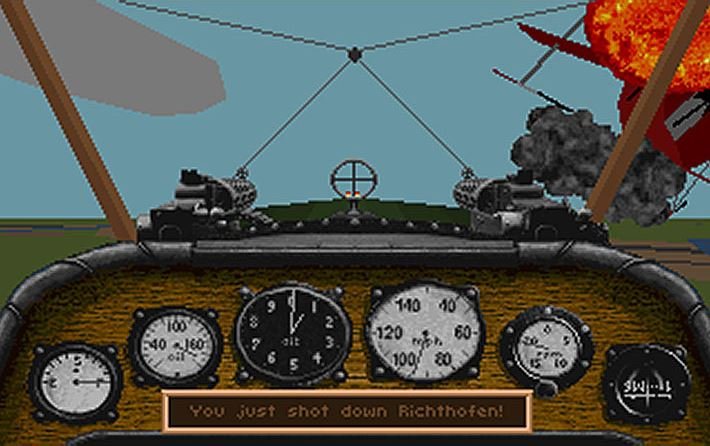
Thanks for taking the time to talk, Damon. So, you’ve said before that of all the games you developed at Dynamix, Red Baron was your favorite. Why that one?
Damon: It was fun. Making Red Baron was hard, but not the hardest game I’d ever worked on. That would probably be Aces of the Pacific – the one that came right after it. I think on Aces of the Pacific we had a little second system effect, where we did too much. We thought, “oh, that’s great – let’s do it” and we over-scoped a bit on it. But with Red Baron I think we had the right scope and we didn’t really make many mistakes on it – and that’s pretty rare when you’re building a game! (laughs) Nothing ended up on the cutting room floor. Everything got in and it was bug free, and I think that’s rare.
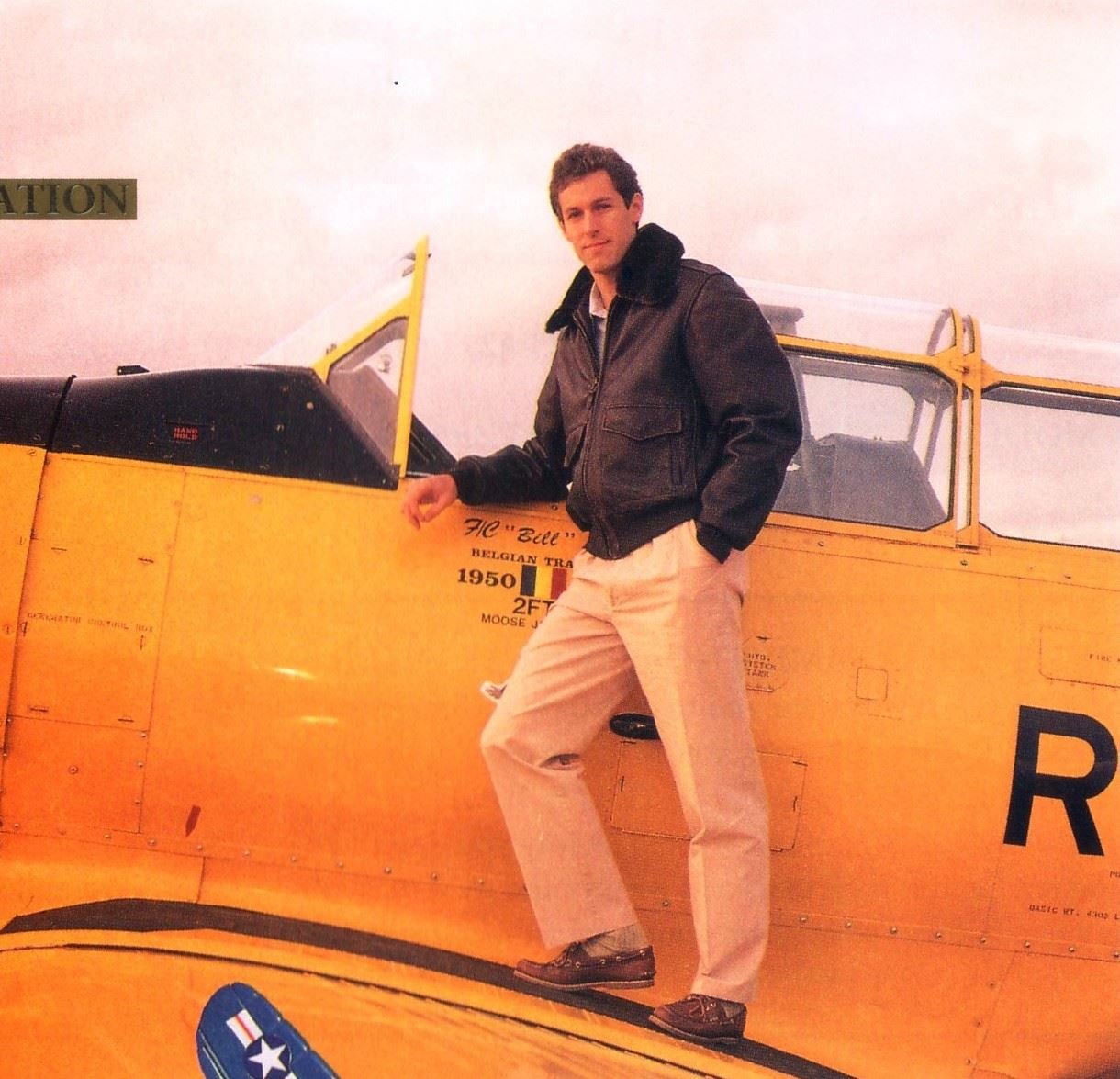
Damon Slye, circa 1992
When you’re iterating on certain kinds of products and categories and you really hit your stride, well, that’s what happened when we were working on Red Baron. We’d done A-10 Tank Killer before, which was a modern flight simulator. We were getting good at building an experience on a computer which is not just the tech – we had the tech, and I think it was probably the best graphics tech on the PC at the time – but we also had the design knowledge of, “how do you create experiences on a computer” and “what can you simulate and what can’t you simulate, and how do you do that?”. In a way it’s… well, I don’t want to say it’s a math formula, but you’re sort of mapping the real world onto the device.
We also had a good team – we had a gelled team where everybody knew what they were doing and were used to working together. We had all the resources because we suddenly had Sierra behind us and could work with a team of their size, whereas with A-10 we did it on our own – underfunded and understaffed.
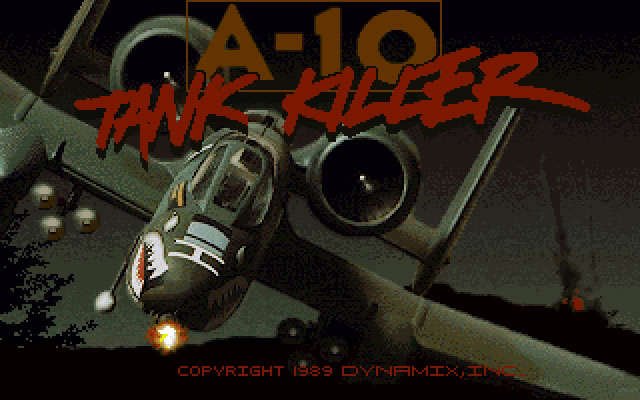
A-10 Tank Killer, released in 1989.
But still, even with Sierra we didn’t have so much money and funding that we tried to do too much. With Aces of the Pacific, everybody just kept saying, “throw more money at the problem!” and that’s usually not a good solution for programming! (laughs) Having read The Mythical Man-Month, that doesn’t really work out very well. Anyway, it all turned out well and I was very happy with the result. I felt like we captured the experience of ‘this is a time machine and now you see what it’s like’ – as close as you can on a computer at that time.
That’s a really cool way to think about it – this game is a time machine back to being a pilot in World War I. Was this an era that you were very interested in and you’d thought for a while that you wanted to make a World War I game? Why not World War II?
Damon: So we’d done A-10 and I wanted to do more flight games because that was a healthy part of the market then, and also I just thought it was something you could do really well on a computer. Back then a lot of people were trying to make movies on computers and I thought that was a mistake because they’re not made for that. I mean, today it’s a lot better to pull something like that off because of the graphics cards, but back then it felt more like square peg, round hole… it doesn’t fit.
I was trying to always build products that were in holes in the markets that weren’t being addressed, so of course I didn’t want to do a modern jet sim like F-16. That’s why we did A-10 in the first place – because it was a very different kind of aircraft to simulate. It was ugly and slow, and missions were totally different. So obviously going back in history made sense. There were already some World War II games out there so we decided to go back to World War I.
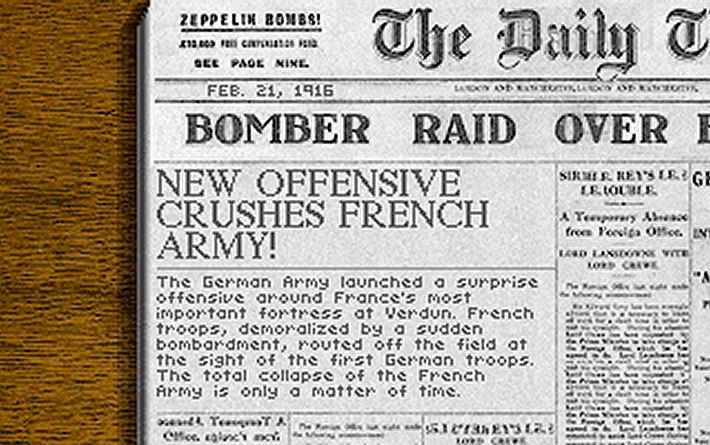
Red Baron using newspapers to tell the story of the war.
We’d also played a game called Fokker Triplane on the Mac, and it was a very primitive game but there was something cool about it, so that was a little bit of inspiration there as well. Originally we were just going to do something called The Great Warplanes and it was going to be every era packed into one giant product. I think maybe three years later EA did something like that.
So when we were going to do The Great Warplanes, it was going to be World War I, World War II and maybe the Korean War, and I got a really nice letter from Ken Williams, who was the president of Sierra. It was very polite because he was respecting the fact that I am the designer and Dynamix was semi-autonomous, and he said something like, “you know, we found in our products that it’s a lot better to create a series of sequels. We’ve done that with Space Quest and King’s Quest, and it just works a lot better. So if you just do everything in one product, you don’t have anywhere to go forward. Why don’t you just do one, and then do more?”.
And so that was his suggestion, and it really struck home – I thought it was a great idea, and we decided we’d just do World War I and then do World War II after that. We thought later we’d do Korea or something, but we never did get around to Korea. I still don’t think that’s nearly as interesting and a lot of that stuff just got a bit boring and was a little too close to the present day. A little too real, you know?
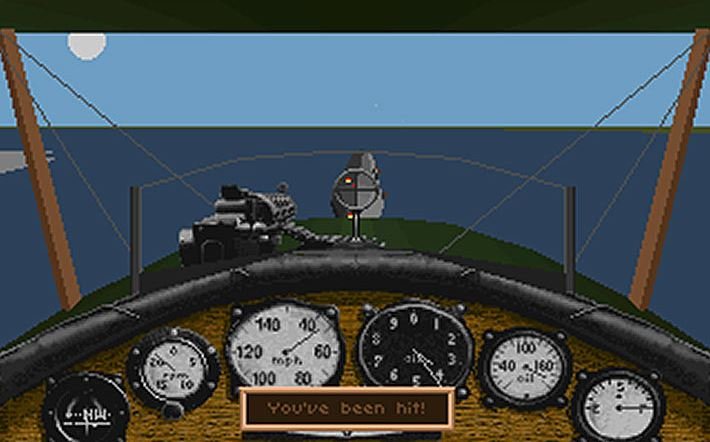
Red Baron presented a wide range of terrain, missions and aircraft – all historically accurate.
Also, I just thought World War I would work the best because the planes are a low slower and a lot closer together, so you can actually see them. Now, in reality if you mapped the pixels correctly on a computer screen, for dogfighting in say World War II, they’d be really tiny (laughs).
And especially with the resolutions you were working with back then?
Damon: And especially with the resolutions – even today, I think, I’m not positive but I bet you a lot of these games like War Thunder are cheating on scale. You just make the plans a little bigger and the show up better on-screen. I think everything would be so tiny and it just wouldn’t be interesting. But you can cheat on scale and not mess up the simulation at all – it doesn’t make it fake.
We also just wanted to get away from the whole modern thing with radar and missiles and stuff which make the gameplay not as good. With those the spatial aspect is not as important. More than that, we weren’t just building a flight simulator, but we were building interactive history. What did it mean to be a pilot at that time? There’s a lot more to that than just simulating an aircraft – it’s like having a movie that’s all visual effects vs having a movie that’s got story and character, while also being realistic and authentic as much as possible.
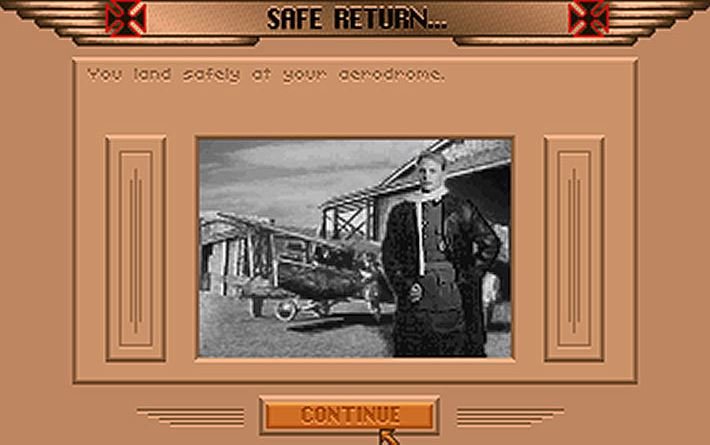
Red Baron’s art style was a direct throwback to the iconic imager of World War I.
So how did you decide on all of the non-simulation aspects of Red Baron? I remember when I played it, you could go into the details of all the pilots, the planes, particular battles… there was great 2D artwork and a lot to read if you wanted to dive into it. How did you decide on those parts that made it more than just a flight game, and into “interactive history” as you say?
Damon: I think part of it is that we had a lot of people who knew what they were doing. Starting with one of your middle points first, which was the artwork, we had a good art department. We had a good art director who was able to bring that stuff out. In terms of the history, one of the inspirations was the Time Life series of books on aviation. One of them was actually Knights of the Sky or Knights of the Air – I remember Microprose did a game with the other version of the name as the title! (laughs)
Microprose did Knights of the Sky – I remember that one.
Damon: OK, so the books were Knights of the Air – and that was our backup name. If we couldn’t call it Red Baron we were going to call it Knights of the Air, which is funny because I think Microprose had the same strategy. In fact, I heard they were trying to get Red Baron trademarked at the same time we were. We collided in the trademark office or something.
So yeah, we were inspired by those books. If you read them, you see that the art style is similar to what’s in Red Baron. And not just the art style, but all the content – I mean, if you look at the books it’s about the pilots, the airplanes, the history, they tactics, the medals, the posters at the time… they were very rich and beautiful and that provided a lot of inspiration for what we wanted to do. In a way we were doing a computer version of what their book had done.
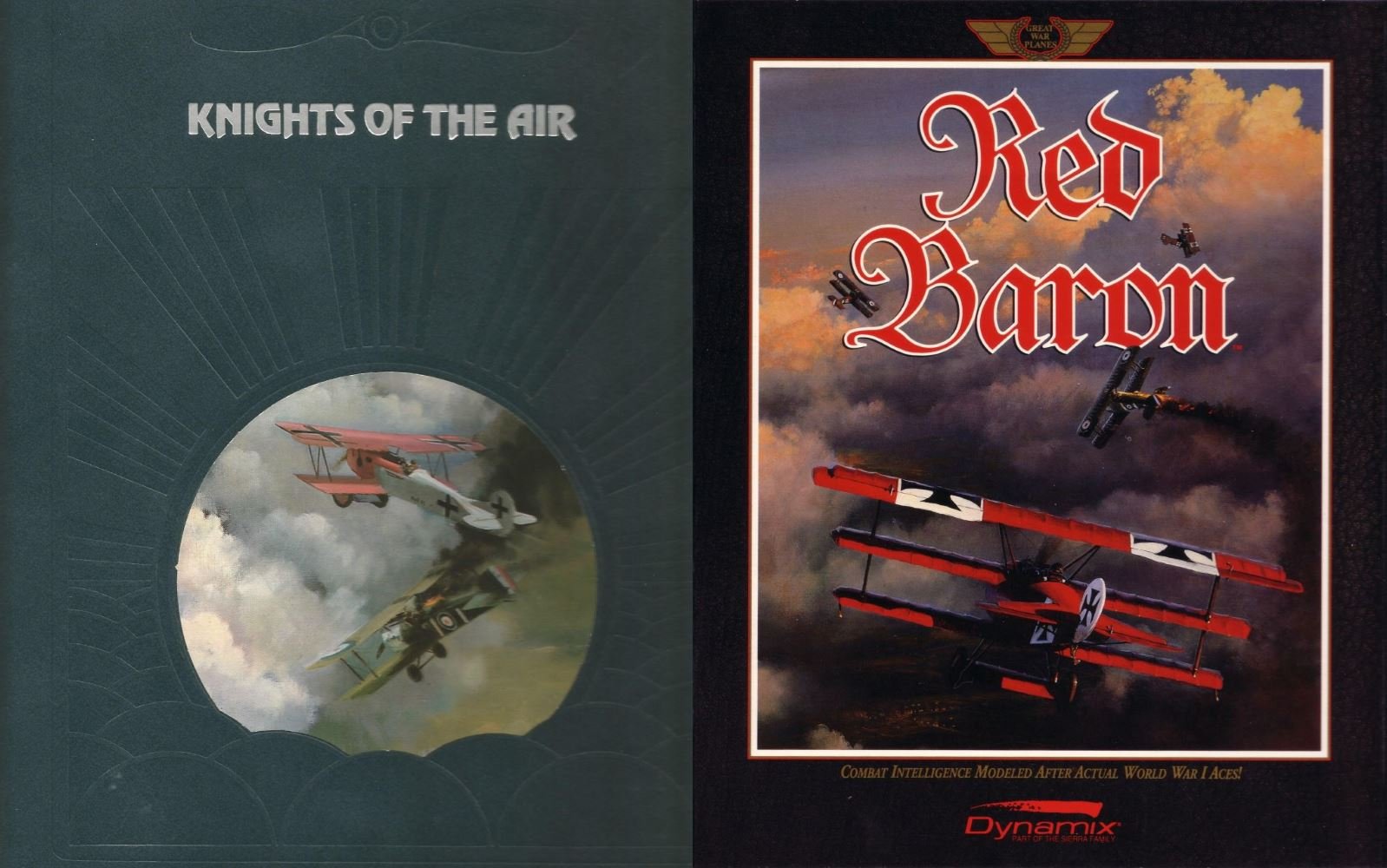
Time Life’s Knights of the Air was the direct inspiration for Red Baron’s art style. View full size.
I just looked at the cover right now and it’s totally on point. It’s totally Red Baron.
Damon: That’s the art style… [Damon opens the link I share with him] Oh my goodness, you’re right! (laughs) There’s the triplane, yeah! So that’s the art style we wanted, and at one point one of the marketing guys wanted us to put an image that was more of a CGI, really cartoony look of a red Fokker triplane and we threw a fit and just said no, it has to look like this. So we got Bill Phillips to do a nice oil painting for the cover that looks kind of like that picture you showed me.
The other part is that then we found a historian who was getting his Masters degree in History at the University of Oregon here. He loved military history and so he was on staff to do all of the research for us, and that was a huge win for us. I don’t think most game developers at that time would have hired a full-time historian!
Who was that?
Damon: John Bruning. He was a full-time employee. We hired him for Red Baron and he did the work on all the follow-ons as well… Aces of the Pacific and Aces over Europe and then some products after I left. And the funny thing is, if you look him up on Amazon now he’s written about 12, maybe 15 books. I like the guy – he’s a good guy. One thing that happened is he did some writing and it was kind of dry and academic and I said, “no, you need to make it like a story, it needs to have dramatic feeling to it. It still can still be realistic and authentic,” and he said that meant a lot to him in terms of his future career as a writer.
Wow, it’s quite a rap sheet he’s got. I’m just looking at his published books now.
Damon: Yeah, he’s been embedded in Iraq and done all kinds of stuff. I think World War II is still his favorite era, but he’s done some modern stuff as well. But, yeah, he started at Dynamix as a game historian writer.
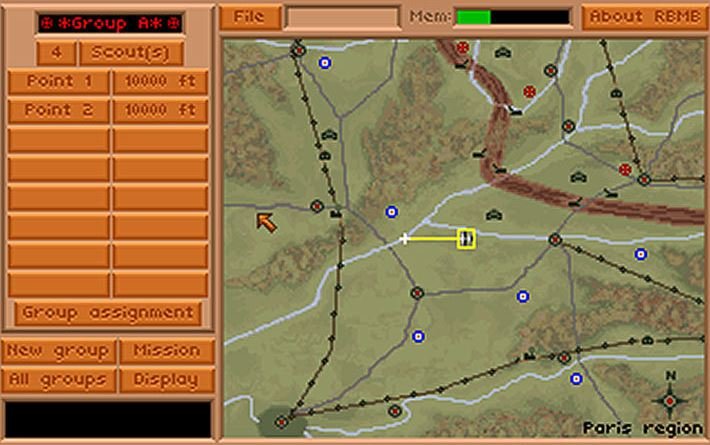
Having John Bruning on board allowed for greater historical accuracy in Red Baron than arguably any other World War I game before it.
Well he must have been the first in the world – or Dynamix must have been the first in the world for any company to have a position like that?
Damon: Yeah, I don’t know of anyone else. That was definitely a good move for us. He was very picky, as he should have been, and would say things like, “no, that’s not right for that squadron. The Jasta was not stationed at that aerodrome at that time – you need to fix that!” or whatever.
Haha, wow, that’s the kind of stuff you’d expect today from a community online, where they’d be the ones pointing that stuff out. But to have that person on your staff must have been really cool.
Damon: Well yeah – his nickname on the team was Grognard. (laughs!) There was a cool moment on Red Baron where after the product had shipped, I think it had been out for like one or two days and John came over and said, “oh no, there’s this tactic I just discovered which the Allies used at the end of the war!”. And it was basically the tactic of zooming down on the plane. It was basically a speed fighter vs an angles fighter, where you zoom down from above, you strafe and then you run away, instead of getting into a dogfight where you’re circling and turning.
So, it was a tactic they discovered and later on they had names for it – these slashing attacks and things like that. And we were like, “oh no! We don’t know if that works!” and so we tested it in Red Baron and it actually worked, so we were really happy to have that in the simulation. We took some of the fast Ally fighters, like probably an S.E.5A and we were able to shoot down the Red Baron pretty easily, whereas before he kept wiping us out when we got into these swirling dogfights.
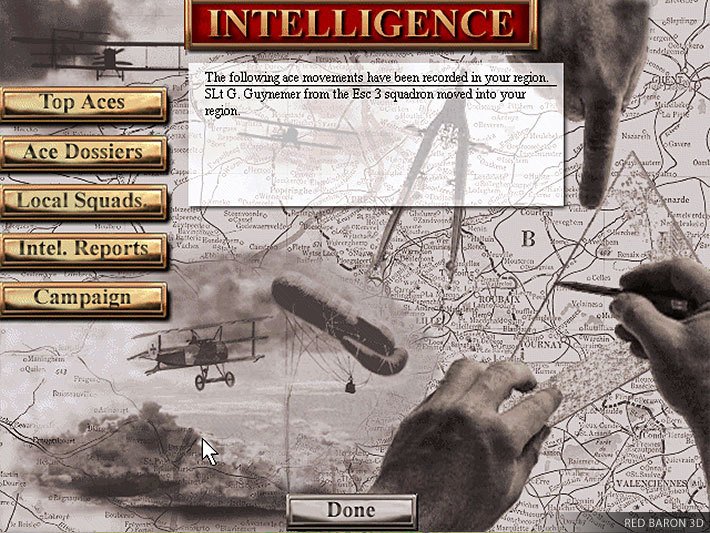 Packaged from head to toe in World War I garb, there was more to Red Baron than just the combat.
Packaged from head to toe in World War I garb, there was more to Red Baron than just the combat.
Did you guys know or find out later that there was a game 10 years prior by Atari called Red Baron?
Damon: Oh, the stand-up arcade game? Yeah we knew about that one and I guess their trademark had already expired in the trademark office. It wasn’t really an inspiration for the game – we hadn’t played it very much – but it might have been an inspiration for Fokker Triplane on the Mac. I think Atari did that as a follow-on to their other game, Battlezone.
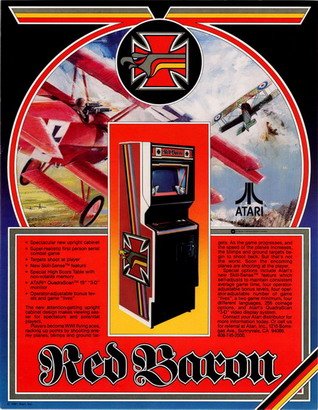
Red Baron by Atari, from 1980.
Yep, it looks like it’s basically the same tech – the same wireframe 3D.
Damon: Yes, exactly. They just made the lines blue instead of green – the CRT. Yeah, I remember these things!
And then the other one I know of is Snoopy and the Red Baron – another Atari game. I don’t know if you know that one? It was on the 2600 VCS.
Damon: No, I didn’t – but look at that! That’s very cute – I love Snoopy. I love those episodes… and it’s funny, because someone also did a version of Snoopy vs. Red Baron later, but that was long after I left.
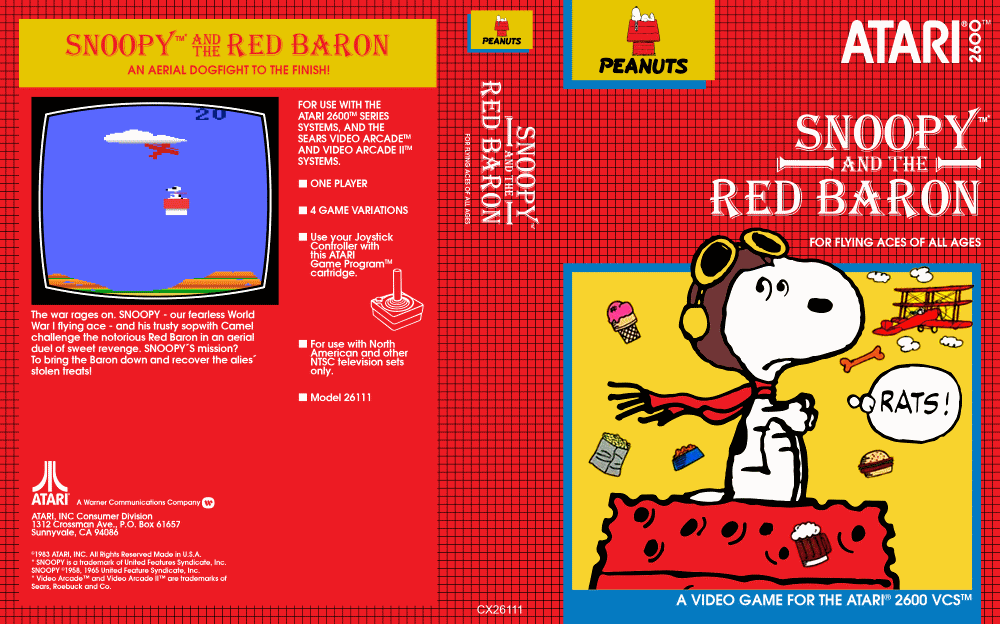 Snoopy and the Red Baron, released in 1983. Image from Deviantart.
Snoopy and the Red Baron, released in 1983. Image from Deviantart.
OK so back to your game – what was its release like?
Damon: I remember we were a little sad maybe six months before the game came out that a bunch of other companies were doing the same thing at the same time. We thought we found a niche that no one was touching, but then “oh, Microprose is doing something, and there’s Wings by CinemaWare!” – and then Blue Max came out that same year, and there as even another one, but I can’t remember the name.
So there were four other games and we got a little worried – especially about Microprose because they had had so many hits. And then even more worried when we heard that they released their game before our game, because often the first to market does the best. I think they launched… probably October… and we launched December 31st! (laughs) We missed Christmas – that was bad!
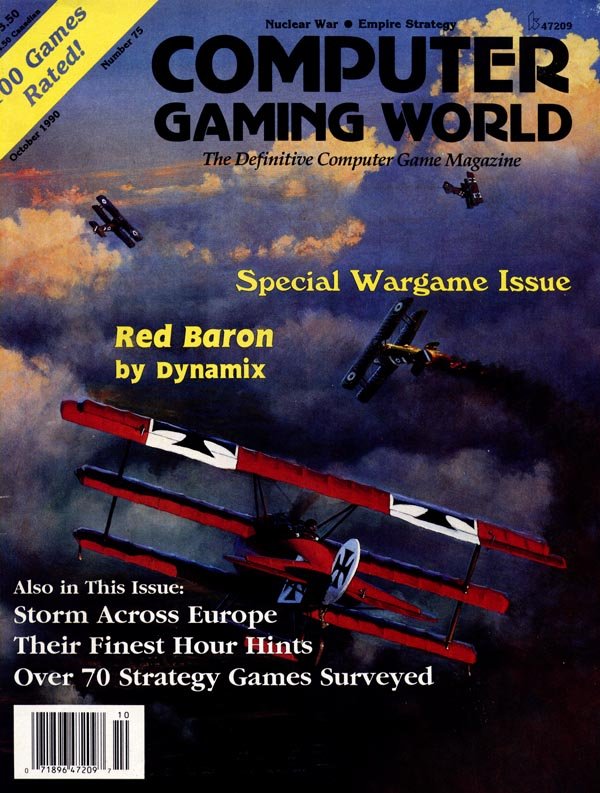
Red Baron made the cover of the October 1990 issue of Computer Gaming World. You can download the full issue of the magazine here.
But then when we played their game, we realized that ours was very different. Theirs felt more arcade-like than hours, and that wasn’t really what I was going for. Theirs felt kind of cute and nostalgic, whereas we were trying to make it not that. There’s still that romantic quality, but we wanted an edge of that dark side of World War I, because it was pretty grim, obviously. Even for the pilots – in the beginning they all felt it was great, it was fantastic, but by the end of the war they’d all totally changed that view. It was horrible – all their friends were being killed and they were basically in shell shock because every time they went up they were fearing that they were going to die. Plus, the fatigue: they would go up to altitudes of 10-15,000 feet and patrolling, and it’s freezing… so we felt our game captured that more, and that’s what we were aiming for.
We weren’t sure, given that we shipped so late, that we would do well, and I think one of the first reviews in the magazines was really luke-warm. That was really disappointing because we didn’t think it was fair. They gave us a B- and compared us to some of our competitors, saying it was apples to oranges, they’re different and neither one is really better. In retrospect, I think they were trying to not upset their advertisers.
But then, it just started selling really well, and I’d rather have that than anything else because it means everybody likes it. It was just selling like crazy – and then on top of it, I was pretty happy when the readers of Computer Gaming World voted it the 4th best game of all time and they put it in their Hall of Fame. So, I thought, “OK, your readers have better taste than your reviewers!” (laughs)
The funny thing is that when a game started selling well back then, then a lot of magazines started giving you awards! It was kind of weird – kind of fake I guess.
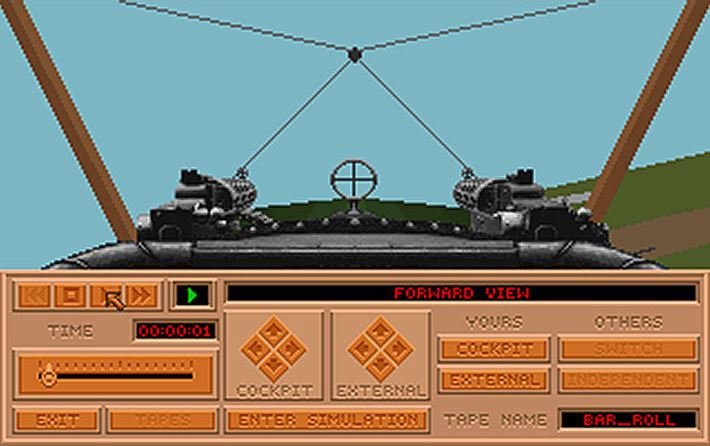 Red Baron included a full mission recorder and replayer.
Red Baron included a full mission recorder and replayer.
So what can you say about the 1998 re-release? Was it an update?
Damon: It was an all-new version built pretty much from scratch. Some of the same team was there, but not a lot. I think the lead artist was still there – Mark Peasley – and a few other people from the team, but it was also a lot of new people. I think it was inspired by the original Red Baron but I don’t want to say it was just a copy or a sequel as they did a lot of their own design work on it, and it got a lot of critical acclaim too.
I wasn’t involved with it at all other than I consulted for one day on the project. I thought they did a really good job and it sold really well. They had better tech at the time and obviously the flight simulation and physics were a lot more accurate.
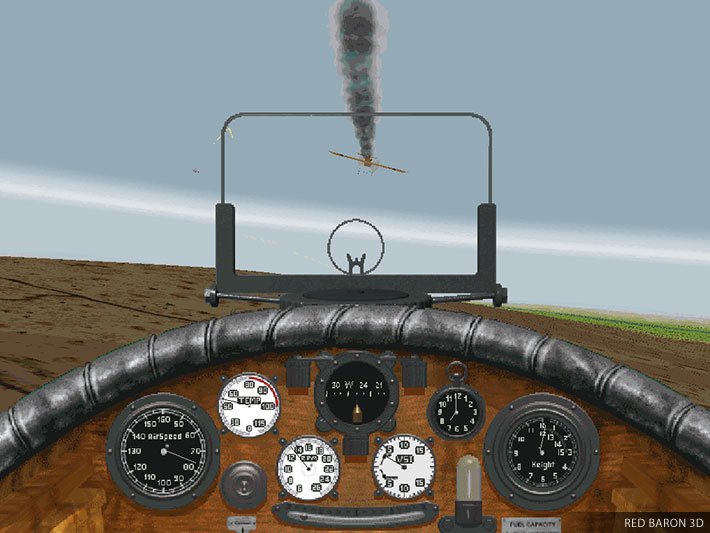 Red Baron 3D, released in 1998 and supported the 3D graphics cards of the time.
Red Baron 3D, released in 1998 and supported the 3D graphics cards of the time.
And one more thing about Red Baron itself – there was a multiplayer version on The Sierra Network a long time ago. Were you involved with that?
Damon: No – they wanted me to do it and I shied away because I didn’t trust the tech at the time. The Internet was too slow and people hadn’t figured out how to handle lag and stuff like that yet, so when I wouldn’t do it, they had someone else make it. Later on, it was a great idea, you know? But not for me at the time. I remember I went to a tradeshow and I played it, and it seemed really fun.
I remember thinking it was fantastic, and I was chasing this guy and just about had him in my sights to shoot him down. I could see him in front of me… and then he shot me down. And he was in front of me, moving away from me! And that was all because of lag. On his computer, he’s behind me. And I just thought, “oooooh, this is bad!” and that was the whole problem that people hadn’t figured out how to handle yet.
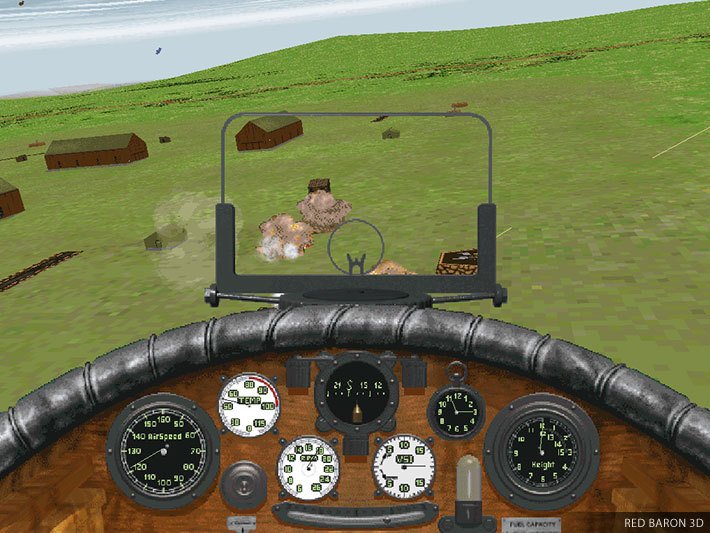 Red Baron 3D: updated and accellerated, but after Damon’s time.
Red Baron 3D: updated and accellerated, but after Damon’s time.
Just before I called you, I saw an article on Polygon from 2015 about crowdfunding a new version of Red Baron. Can you tell me a bit about that please?
Damon: Yeah – we were and are trying to find funding for that project. We still haven’t got a funding source. The big publishers have just sort of abandoned the category, which is foolish because back in 2007 I was arguing that you could do a free-to-play flight game, have it arena-based, historical, and MMO-style with an item shop, and we built the game: Ace of Aces.
The publisher went out of business, and then World of Tanks appeared… and I was also going to do a tank one! (laughs) But to me it was clear – there was easily going to be a million players worldwide who would play a flight game like that.
Is it still something that you’re actively pursuing or would pursue? I know you had the Kickstarter a while back.
Damon: We definitely would pursue it. I have pursued it and we keep just hitting dead ends. I have had various people looking into it for private funding and Kickstarter… although we kind of botched the Kickstarter, and I blame ourselves for that one. Also, we got some bad advice that we shouldn’t do any PR before we start the Kickstarter (laughs) – and as a result, we didn’t build a community first.
The advice was that if we got all this press before the Kickstarter was live, then people would not be able to contribute any money… and that’s just wrong. You have to build it up ahead of time. To blame myself, I actually spoke to Brian Fargo and he said the same thing: you gotta build the community first.
OK – well it would be really great to see you guys have a successful campaign, be it through Kickstarter or Fig and see a new version of Red Baron.
Damon: Thank you. That would be great.
Well thanks very much Damon, really appreciate it and I’ve really enjoyed talking to you.
Damon: Yeah, it’s been great talking to you. It’s been fun.
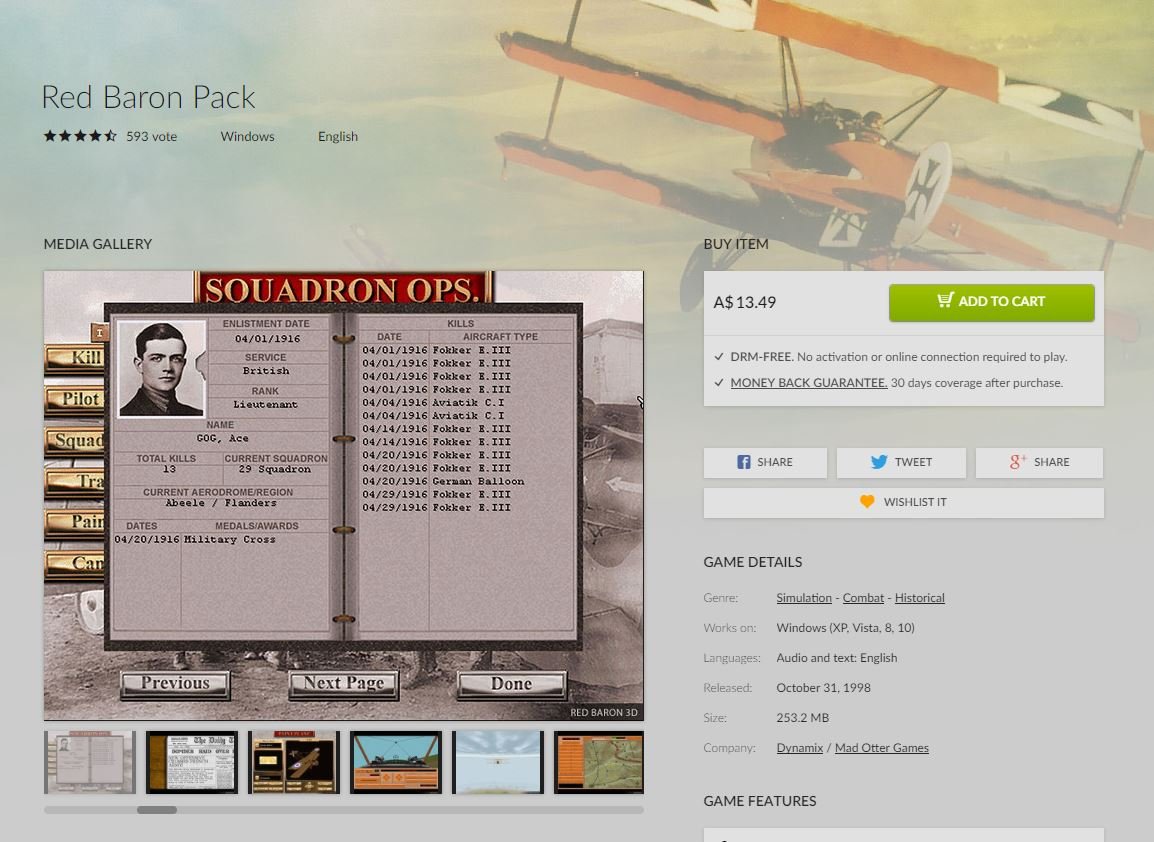
The Red Baron Pack on GOG.com. Want to win yourself a free copy of the Red Baron Pack courtesy of GOG.com? Simply post in the comments and let me know. The top 10 comments will each get a code for the game, and I’ll be judging comments based on entertainment factor, so go wild! It can be a humourous take on why you deserve the game, a description of an imagined battle, a cool story you remember of playing this game back in the day – go wild! Oh, and bonus points if you resteem this post.
Rules:
- You can post as many entries as you like - just make an additional comment for each cool idea.
- Entries must be posted here by 12pm (midday) GMT on Sunday 30th July.
- I will be handing out the games via Discord, so be sure to have an account and be logged in to https://discord.gg/HYj4yvw
- You have 24 hours from the end of the contest to claim the code from me (I use badastroza on Discord as well) and redeem your key via GOG.com
A huge thanks to Damon Slye for taking the time to talk. Check out his current projects at Mad Otter Games and follow Damon on Twitter here. Thanks to GOG.com for the Red Baron screenshots used in this interview.
Previous:
Interesting People #12: Joel Manners on Origin, developing Ultima, open-world game design, and more
Next:
Interesting People #14: Mikael Haveri on Nex Machina and Matterfall
